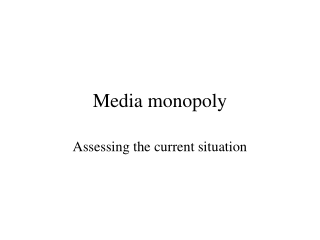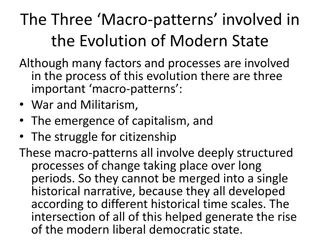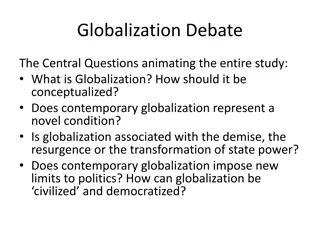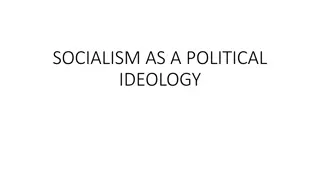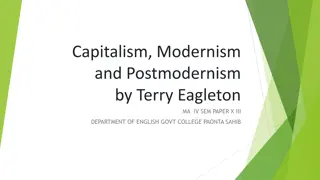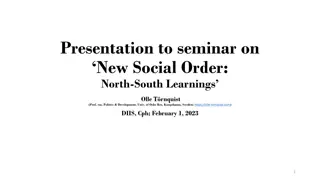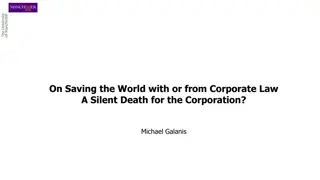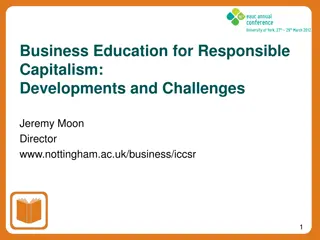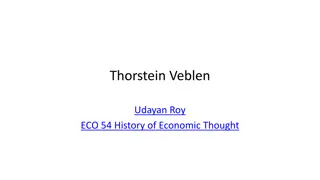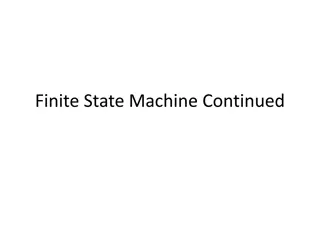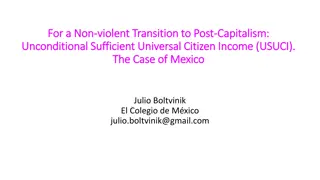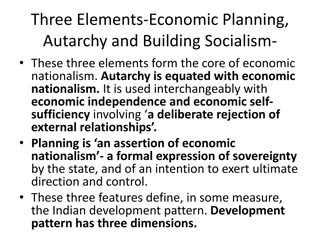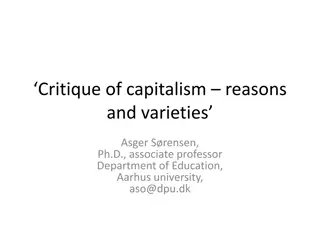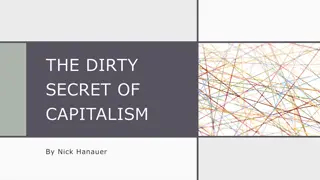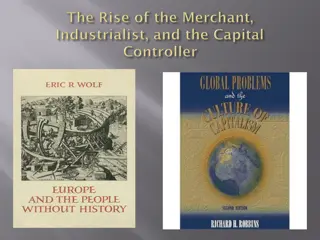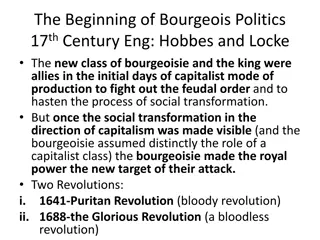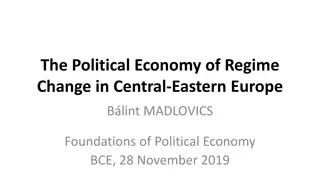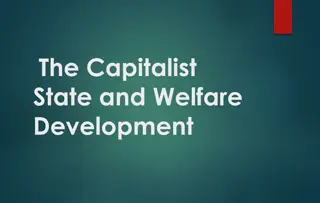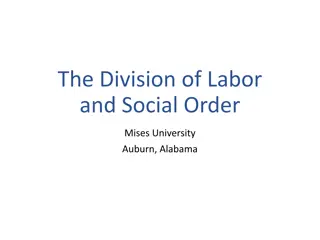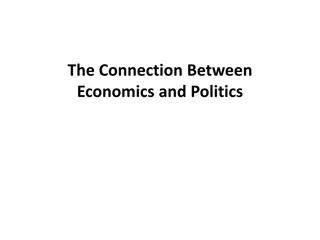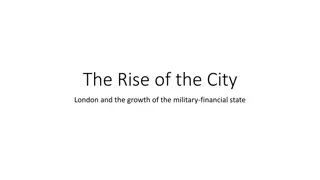Media monopoly
Explore the implications of corporate media control on politics, culture, and democracy. Analyze the challenges faced in contemporary debates about media control. Assess the role of new communication technologies in reshaping media power dynamics. Understand the transformation of the U.S. media syst
2 views • 47 slides
A.R. Desai: Contributions to Indian Nationalism and Sociology
A.R. Desai, a prominent figure in the field of sociology, made significant contributions to Indian nationalism and the study of society in India. His works focused on topics such as the social background of Indian nationalism, peasant movements, path of development, and Marxist democratic rights. De
5 views • 14 slides
Evolution of Modern State: Three Macro-Patterns Explored
The evolution of the modern state is influenced by three key macro-patterns: War and Militarism, Emergence of Capitalism, and Struggle for Citizenship. These patterns involve deep processes of change over long periods, contributing to the development of modern liberal democratic states. War and Mili
0 views • 13 slides
Debate Framework for Capitalism vs. Communism
This debate framework presents a structured approach for arguing in favor of or against the motion that capitalism is superior to communism. It includes sections such as introduction, statement of the motion, definitions, and criteria or principles to guide the debate. Emphasis is placed on developi
0 views • 9 slides
The Historical Significance of the First Islamic State in Medina
The Islamic State in Medina established by Prophet Muhammad marked the beginning of a new era in Islamic history. It was the first welfare state, where divine teachings were implemented under his guidance. This state pioneered the integration of spiritual and temporal authorities, setting the founda
0 views • 60 slides
Insights Into 'An Inspector Calls' Characters
In "An Inspector Calls," the Inspector represents socialism, with an air of solidity and omniscience. He delivers a warning about mankind needing to change and accept responsibility. Mr. Birling, on the other hand, embodies capitalism, shown as unlikeable and out of touch. The play critiques Birling
0 views • 7 slides
Overview of State Whistleblower Act in Washington State
The State Whistleblower Act in Washington State, governed by the Revised Code of Washington (RCW) 42.40, provides a mechanism for state employees to report improper governmental actions. The Act aims to encourage whistleblowers to come forward, prohibits retaliation, and authorizes remedies for viol
0 views • 28 slides
Understanding Marxism and Capitalism
Marxism is a body of social, political, and economic thought derived from the works of Karl Marx and Friedrich Engels, focusing on the analysis of capitalism. Capitalism is an economic system where private individuals own goods and services based on market supply and demand. The purest form of capit
0 views • 25 slides
Understanding Insiders and Outsiders in Arab Political Economies
Examining core Arab countries outside the Gulf, this analysis delves into the unique features of Arab capitalism, highlighting low state capacity, heavy regulation, and segmented labor markets. State intervention plays a crucial role in creating insiders and outsiders, shaping a landscape of low ski
1 views • 56 slides
The Globalization Debate: Understanding Contemporary Perspectives
The debate on globalization revolves around defining it, its impact on state power, and the role of politics. Three main schools of thought - Hyperglobalizers, Sceptics, and Transformationalists - offer contrasting views on whether globalization is primarily an economic phenomenon reshaping traditio
0 views • 12 slides
Understanding Socialism: A Comprehensive Overview
Socialism is a political and economic ideology that advocates for collective or state ownership of production, distribution, and exchange. It emerged in the early 19th century as a response to industrial capitalism, aiming for a more egalitarian society that prioritizes collective well-being. Social
0 views • 9 slides
Understanding Capitalism, Modernism, and Postmodernism in Literature
Terry Eagleton's essay delves into the impact of capitalism on art and literature, exploring the emergence of modern and postmodern literature in the capitalist and late capitalist eras. He discusses how late capitalism influences art with characteristics like mass consumerism and virtual reality. P
1 views • 7 slides
Social Democratic Politics: Pillars and Strategies for Transformation
Social democratic politics is rooted in democratic collectivities and rights, aiming to reshape capitalism through reform, regulation, and transformative strategies. Olle Törnquist delves into the historical foundations and the need for comprehensive reforms to challenge the dominant logics of capi
3 views • 10 slides
The Role of Corporate Law in Wealth Distribution and Capitalism
Exploring the evolution of corporations within capitalist frameworks, this analysis delves into the intertwined concepts of managerialism, infinite wealth accumulation, and the social-historical embeddedness of corporations. Through historical contexts and theoretical perspectives, the discussion de
0 views • 17 slides
Evolving Trends in Business Education for Responsible Capitalism
Explore the developments and challenges in business education for responsible capitalism, focusing on the role of business schools, a decade of progress in programs and research, and analysis of UN PRME signatory reports. Discover how sustainability-related research and learning offerings are shapin
0 views • 25 slides
Exploring the Moral Foundations of Capitalism
Delve into the historical origins and ethical principles underpinning capitalism as seen through iconic quotes, foundational texts, and philosophical analysis. Understand the intertwined concepts of liberty, economics, philosophy, and ethics that shape capitalist ideology and practices, emphasizing
0 views • 42 slides
Shadow Education and Educational Capitalism in Cambodia
Exploring the impact of shadow education on the nation-state in Cambodia, this analysis delves into the complex interplay between educational development, compulsory schooling, privatization practices, and the emergence of educational capitalism. It questions the traditional notions of nation-state
0 views • 8 slides
Queer Art Beyond Identity Politics: Exploring Capitalism, Gentrification, and LGBT+ Inequalities
Explore the complex intersections of capitalism, gentrification, and LGBT+ identities through the lens of queer art and community activism. Unpack the nuances of human capital theory, dominance of middle-class white gay men, and challenges faced by people of color within the LGBT+ community. Contemp
0 views • 13 slides
Thorstein Veblen: Critic of Capitalism and Founder of American Institutionalism
Thorstein Veblen, a key figure in the history of economic thought, criticized capitalism for its rough and monopolistic nature. He founded the American Institutionalism School and challenged neoclassical economics' view of rational consumer behavior and business motivations. Veblen's analysis focuse
0 views • 23 slides
Work-Life Balancing Practices in Slovenia
Exploring the capabilities of individuals in reconciling paid work and parenthood in Slovenia against the economic background of transitioning to capitalism and crisis. The study focuses on gender equality objectives and challenges, organizational values, flexibility, and societal changes affecting
0 views • 12 slides
Understanding Finite State Machines in Digital Logic Design
Finite state machines play a crucial role in digital logic systems, allowing for the implementation of sequential circuit designs. These machines consist of states and transition functions, determining system behavior based on inputs and current state. The output function generates outputs based on
0 views • 35 slides
Transition to Post-Capitalism: Unconditional Citizen Income in Mexico
Unstoppable technology advancements in capitalism lead to the replacement of human labor, creating an insufficient wage-labor income link. The concept of an Objective Limit of Capitalism (OLC) suggests that the need to exploit human labor will diminish as science progresses, highlighting the necessi
0 views • 7 slides
Economic Nationalism and Development Pattern in India
Economic nationalism in India was characterized by the elements of economic planning, autarchy, and socialism. The development pattern focused on capital goods industries, inward orientation, and state ownership. Two interpretations of this pattern were influenced by economic theory and Marxist pers
0 views • 13 slides
Developing State Personal Income Distribution Statistics
This project aims to create a distributional account for State Personal Income, allowing for the analysis of inequality by state and over time. Using various data sources such as BEA aggregates and IRS statistics, the distributional model provides insights into state-level income inequality. Census
0 views • 17 slides
Critique of Capitalism: Reasons and Varieties by Asger Sørensen, Ph.D.
Asger Sørensen, Ph.D., delves into the critique of capitalism, exploring various perspectives such as political contestation, economic analysis, and value assessment. Through historical contexts and theoretical frameworks, Sørensen raises fundamental questions about capitalism's impact on freedom,
0 views • 10 slides
Unveiling the Dirty Secrets of Capitalism by Nick Hanauer
Nick Hanauer, a successful capitalist, sheds light on the flaws of capitalism and neoliberal economic theory, emphasizing the need for regulatory changes to benefit the majority. He challenges the assumptions of market capitalism and advocates for a new economic approach focused on cooperation and s
1 views • 25 slides
The Emergence of Capitalism and Global Trade Dynamics
European expansion from the 15th century onwards saw the rise of a commercial network on a global scale, driven by a blend of economic interests and political power. The capitalist system evolved through strategic trade, market expansions, and a regional division of labor. The movement of goods and
0 views • 58 slides
The Evolution of Bourgeois Politics in 17th Century England: Insights from Hobbes and Locke
The emergence of bourgeois politics in 17th century England marked a significant shift in power dynamics as capitalism began to take hold. The bourgeoisie initially allied with the monarchy to overthrow the feudal order but later turned against the royal power. The Puritan Revolution and the Gloriou
0 views • 20 slides
Understanding State Aid Regulations in the EU Post-Brexit
State aid regulations play a crucial role in ensuring fair competition within the EU. Post-Brexit, the UK is likely to still be bound by these rules. State aid is defined as any form of aid granted by a Member State that distorts competition, posing challenges for trade between Member States. The EC
0 views • 18 slides
Exploring Surveillance Capitalism and Academic Skills
Delve into the world of surveillance capitalism, academic skills, and the importance of maintaining an academic tone in speaking and writing. Explore self-assessment tools, including assessments on online privacy and security. Learn from experts like Mark Weinstein about social media, privacy advoca
0 views • 20 slides
A Brief History of Communism: From Capitalism to Karl Marx's Vision
The history of communism traces back to the capitalist system's exploitation of workers in the mid-1800s. Karl Marx's vision, outlined in "The Manifesto of the Communist Party," aimed for economic equality and worldwide revolution. The inherent flaws of capitalism were critiqued, leading to the rise
0 views • 17 slides
State Machine Abstraction for Dynamic Network Actions in SDN
State machines are proposed as a new switch primitive in Software-Defined Networking (SDN) to facilitate dynamic actions at switches. This approach eliminates the need for a priori knowledge, reduces delays, and enables local state-based policies such as stateful firewall, FTP monitoring, and large
0 views • 6 slides
The Political Economy of Regime Change in Central-Eastern Europe
The content discusses the concepts of socialism and capitalism, exploring various models and transitions from socialism to capitalism. It focuses on regime changes in Central and Eastern Europe, with case studies on Poland and Hungary. The text covers different varieties of socialism and their econo
0 views • 21 slides
Evolution of Capitalism and Welfare Development
Earnest Mandel identified three types of capitalism - industrial, entrepreneurial, and corporate - each influencing welfare development differently. Industrial capitalism lacked state welfare, while entrepreneurial capitalism introduced social security measures. Corporate capitalism necessitated sta
0 views • 10 slides
The Division of Labor and Social Order in Capitalism
In capitalism, conflict is viewed as an essential component of social relations, leading to increased productivity and unity among individuals. The division of labor promotes specialization and efficiency in production, ultimately benefiting society as a whole. Comparative advantages and opportunity
0 views • 16 slides
The Interplay of Economics and Politics: A Comprehensive Analysis
Explore the intricate relationship between economics and politics, delving into the evolution of capitalism, the necessity of private property rights, challenges in establishing capitalism in certain countries, and the complex dynamics between capitalism and democracy. The discussion highlights the
0 views • 9 slides
Exploring the Complex Relationship Between Football and Capitalism
The relationship between football and capitalism is analyzed through contrasting viewpoints, with one side viewing football as a tool for distracting the populace and compensating for societal injustices, while the other sees it as a form of art and human expression. The discussion delves into the s
0 views • 26 slides
The Evolution of London: Military-Financial State to Capitalist Metropolis
The rise of London as a military-financial state led to the growth of the aristocracy and state capitalism. The dissolution of monasteries fueled the rise of gentry and landholders, with practices like enclosure and rent-racking becoming common. The development of the credit system and the legalizat
0 views • 12 slides
Understanding China's Bureaucratic Capitalism and State-Directed Economy
China's approach to capitalism under Deng's reform embodies state-directed capitalism, characterized by central control over economic reforms while maintaining a non-democratic political system. This model has led to the rise of a bureaucratic capitalist regime with state-backed companies dominating
0 views • 11 slides
Overview of State Government and State Legislatures in Florida
A federal system is a political framework where power is divided between a central government and individual states. In this system, laws created by Congress take precedence over state laws. The supremacy clause enforces this hierarchy. States are prohibited from actions like declaring war or mintin
0 views • 12 slides
